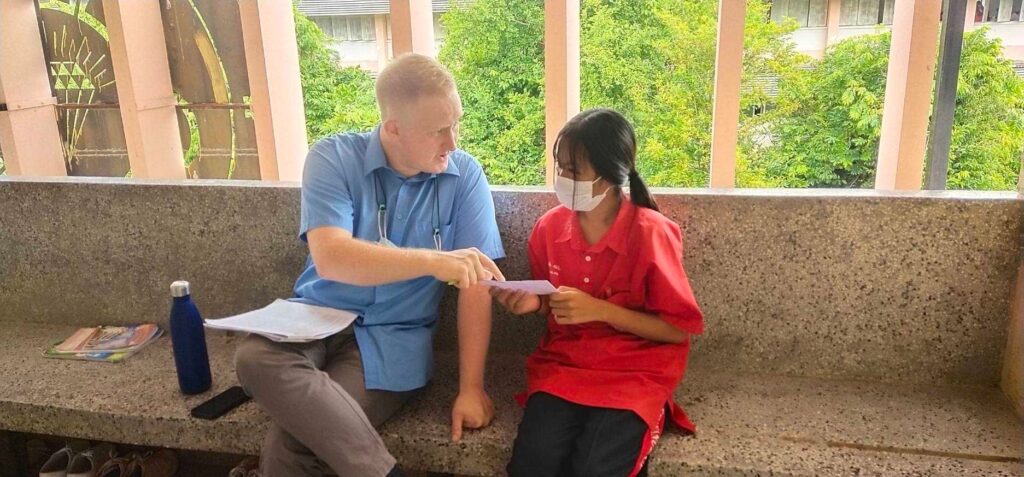Starting a new job anywhere is challenging. Learning the dos and don’ts can take weeks, if not longer. And even within the same country – working cultures vary. Let alone halfway across the world.
Becoming a teacher in Thailand is a brilliant experience, with so many positives. But it’s crucial to understand how their work culture differs from that found in the west.
Learning and respecting those differences is a crucial part of creating good relationships with new colleagues and employers, leading to a wholly more positive experience.
Do what’s asked of you
 In western countries, questioning an unreasonable request from a senior staff member wouldn’t always be deemed as improper. That is providing a valid point is raised, and is done so respectfully. If extra unpaid work is requested, or a last-minute change to the schedule is announced, challenging it wouldn’t be out of the question.
In western countries, questioning an unreasonable request from a senior staff member wouldn’t always be deemed as improper. That is providing a valid point is raised, and is done so respectfully. If extra unpaid work is requested, or a last-minute change to the schedule is announced, challenging it wouldn’t be out of the question.
But in Thailand, as is the same throughout most of Asia, defying authority is not something that’s done.
Instructions travel from the top down. And in the Thai school system, the hierarchy is respected. And the school director is king. What they say goes. Not fulfilling what’s expected, regardless of who delivers the message, is as good as defying the head of the school directly.
So, the best way foreign teachers can maintain a positive relationship with their school – is to say yes to whatever it is they’re asked to do. And to resist the urge of questioning authority, however politely or legitimate the concern.
Because although Thai schools may ask a lot of their foreign teachers, and communicate with them in a manner that’s unfamiliar, they usually try their best within the parameters of their own working culture. And they’re rarely unreasonable or ask too much.
It’s also important to remember that Thai teachers have far more work to do than their foreign counterparts, but suffer the same issues for the duration of their careers. And often for a significantly lower salary. Thailand’s work culture is what it is. And it’s not going to change.
Despite its potential downfalls, it should be respected. And the best way foreign teachers can do that is by simply saying yes.
Do it with a smile
Foreign teachers are often the last ones to be notified about schedule changes, upcoming events they’re expected to take place in, and additional duties they’re required to complete. This can lead to frustration, because treating employees in this manner would not be deemed acceptable in the countries they’re from.
But accepting changes, and fulfilling unexpected or extracurricular responsibilities – is only half the equation.
Doing things with a smile, and maintaining a positive attitude, is another crucial part of nurturing the relationship between foreign teachers and their schools.
This is due to the importance of ‘saving face’, a bizarre concept to people from western countries, but one that’s common throughout Asia. It’s a complicated and obscure notion with deep roots in the past. Effectively, it causes people to hide negative emotions which could be deemed undesirable, and lead to social rejection.
There’s a lot more to it than that, but hiding discontent and anger is the key takeaway in this case.
This explains why it’s uncommon to see Thai people getting upset or angry in the street. The same is true within school settings, if not more so. Even when dealing with disruptive students, teachers rarely become irate. And students responses to being disciplined are a far cry from the frustration and anger on display in western schools.
We are generalising slightly, but even during an awful day, Thai teachers conduct themselves with a smile and do their upmost to keep their peers from discovering how they’re really feeling. Not wanting to break the status quo.
Displaying discontent and frustration may be common place in western cultures. But it’s not in Asia. Adjusting to the ‘saving face’ culture can be alien and challenging for foreign teachers, but it’s important they do their best to fit in.
And those who do rein in negative emotions, always wear their biggest smile, and hide any dissatisfaction they may have – will be much more likely to gain favour of their Thai colleagues, seniors, and management. Subsequently making their work experience easier and more pleasant.

Don’t complain about it
Even after saying yes, and complying with a smile, the potential to derail blossoming relationships between foreign teachers and their schools lies in a practice commonplace throughout western culture.
Whether it’s over something small and insignificant, or a major issue that’s rocked the workplace, people in western countries are not afraid to complain.
And when we say complain, we are referring to colleagues speaking, rather than a complaint taken to a senior staff member.
As we mentioned, it’s natural for foreign teachers to develop some feelings of frustration and annoyance as they adjust to a new and different working culture. But what’s also natural, is to discuss the issues faced by all with other foreign teachers within the school.
With common ground and familiar experiences, foreign teachers are likely to share aggrievances.
But complaining to each other has a tendency to add fuel to the fire, and can create an ‘us vs them’ mentality. Which can then lead to tension and the risk of turning a pleasant work environment into a toxic one.
Although some Thai teachers may not be able to speak English, there are plenty that do. So complaining in the office, canteen, or wherever – is unlikely to go unnoticed. And regardless of their English ability, reading body language and tone of voice is a universal ability.
It links to the idea of ‘saving face’. Displaying feelings of displeasure within the school setting can cause problems, and complaining is a sure-fire way to do that.
Discussing and debating controversy outside of the work place, at home or in a bar, is fine. But to keep colleagues and senior staff members onside, complaining should be kept as far away from school as possible.
Adjusting to culture shock is one of the biggest challenges when moving abroad. And a significant part of overcoming it is acceptance.
Realising that things are as they are, regardless of how people may feel about them, they aren’t going to change.
Respecting and conforming to Thai culture, more specifically Thai working culture, is the best and only way to make the most of time spent as a teacher in the wonderful kingdom of Thailand.

Note to you
Now, we would like to speak to you directly. Teachers in Thailand, those waiting to go, and others who are still considering it – Thailand is a magical place, and Thai schools are brilliant places to work.
Yes, foreign teachers do occasionally face obstacles that can frustrate them. But issues are rarely significant.
The intention of this article is to inform and prepare, not cause concern.
Impact Teaching teachers who do face problems at school will always receive our full support and guidance. With the help of our local partners, Kids English Thailand, communication with schools can be done in the right way. Or at least – the Thai way.
Teaching in the kingdom delivers a unique opportunity to dive head first into a completely new and different culture, that you can’t find anywhere else.
Discovering, learning, and accepting that culture only leads to positive outcomes. Creating more rounded and developed human beings in the process.
Ready to start your teaching adventure in Thailand? Explore our program page or submit an application




